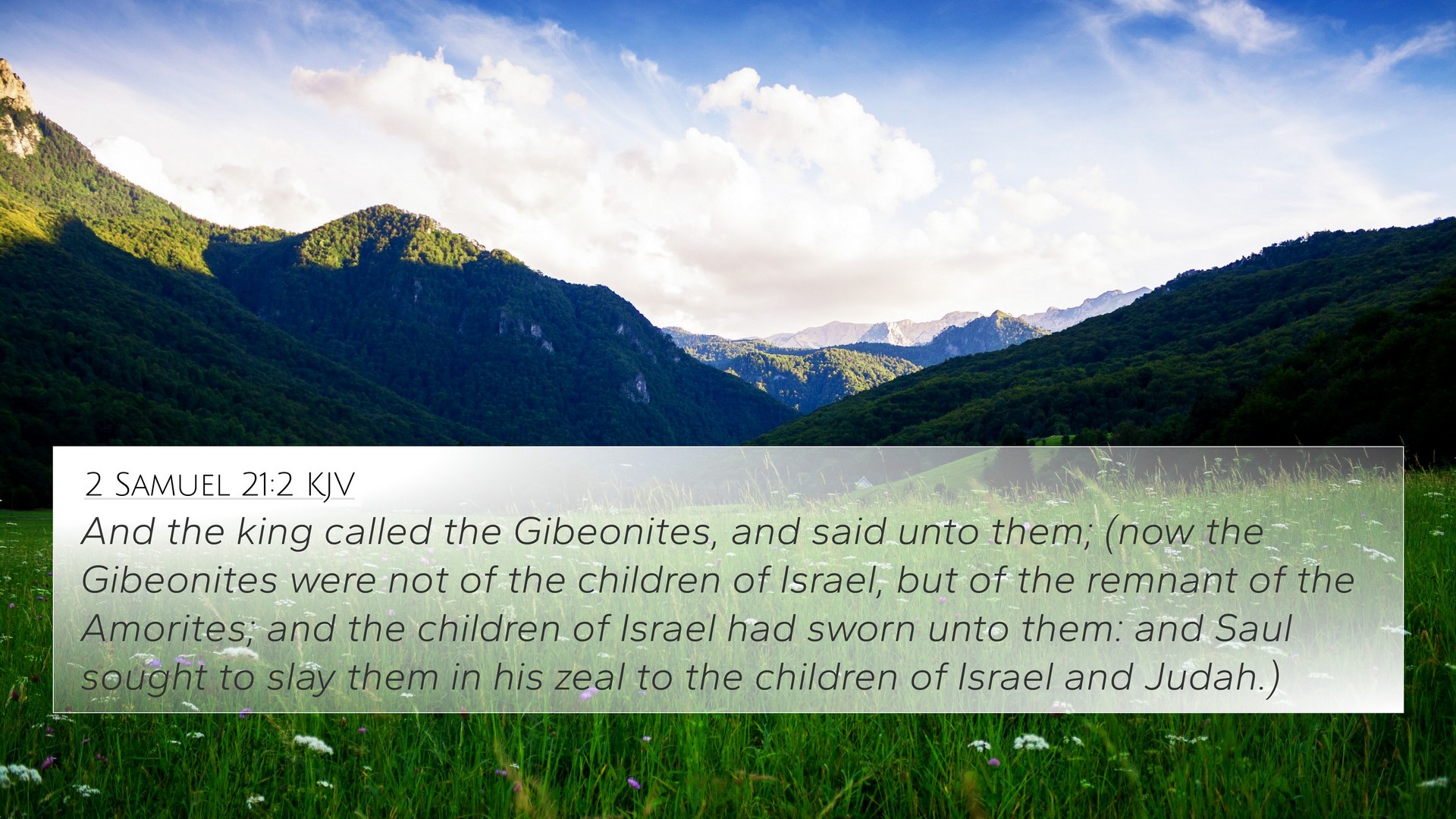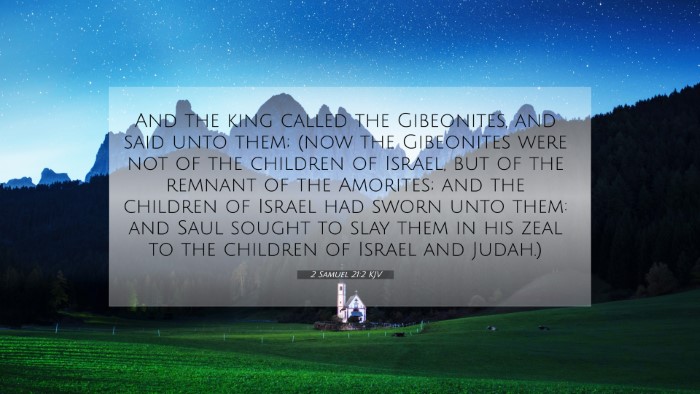Understanding 2 Samuel 21:2
In 2 Samuel 21:2, an important narrative unfolds regarding King David and the Gibeonites. This verse states:
"And the king called the Gibeonites, and said unto them; (now the Gibeonites were not of the children of Israel, but of the remnant of the Amorites; and the children of Israel had sworn unto them: and Saul sought to slay them in his zeal to the children of Israel and Judah.)"
Contextual Overview
This verse sets the stage for understanding the covenantal obligations of Israel and the consequences of breaking such agreements. The Gibeonites, although not part of Israel, had entered into a covenant with them, which was violated under King Saul.
Commentary Insights
Here, we combine insights from public domain commentaries to illuminate the meaning of this verse:
- Matthew Henry: Henry emphasizes the gravity of not honoring oaths. The actions of Saul reflect a zeal that disregards the spirit of the covenant and the divine principles established among God’s people.
- Albert Barnes: Barnes notes that the Gibeonites had a complex relationship with Israel, showcasing the tension between national identity and the moral obligations that arise from unconditional agreements. The mention of Saul’s zeal serves as a warning about misguided piety.
- Adam Clarke: Clarke provides additional historical context, explaining that the Gibeonites were wise in their dealings and that their survival hinged on the respect and fulfillment of promises made by Israel. He highlights the importance of inter-ethnic relationships in the biblical narrative.
Biblical Themes and Cross-References
The themes in this verse reverberate throughout other biblical texts. Here are some meaningful connections:
- Joshua 9:15 - The original covenant made with the Gibeonites by Joshua, highlighting the importance of oaths.
- Exodus 20:16 - God’s command against bearing false witness, relevant to David's responsibility to uphold oaths.
- Numbers 30:2 - A reminder of the sacred nature of vows, underscoring the seriousness of breaking promises.
- Deuteronomy 23:21-23 - Instructions about making and keeping vows to the Lord, providing moral context for David's actions.
- 1 Samuel 15:22 - The nature of obedience to God’s commands, reflecting the consequences of improper zeal.
- Psalms 15:4 - A description of the righteous who keep their word even when it costs them.
- Romans 12:19 - Paul’s teachings on vengeance and the stance of a believer in conflicts, relating to Saul's actions against the Gibeonites.
Application and Reflective Questions
Reading 2 Samuel 21:2 encourages readers to reflect on the importance of faithfulness to one’s commitments:
- How do our personal and community oaths reflect our faith in God?
- In what ways can we ensure that we uphold our commitments to others?
- What lessons can we learn from Saul's misunderstanding of zeal and righteousness?
Thematic Links and Cross-Referencing
This verse acts as a nexus for broader biblical themes regarding justice, righteousness, and covenantal faithfulness. To explore inter-Biblical dialogue, consider:
- How does this narrative compare with New Testament principles of covenant? (Hebrews 8:6)
- What are the implications of the covenantal duties illustrated here on Christians today? (Matthew 5:33-37)
Conclusion
2 Samuel 21:2 is a significant verse that highlights the importance of honoring commitments, regardless of the political or social circumstances. By incorporating cross-references and thematic analysis, we can understand its implications for moral and spiritual conduct.
For those seeking to deepen their engagement with the scripture, employing a Bible concordance and cross-reference Bible study methods can provide valuable insights into the connections between various scripture passages, enriching your understanding and personal application of Biblical teachings.
Further Study Tools
As you delve further into the texts, consider utilizing:
- Bible cross-reference guide for identifying similar themes across the scripture.
- Bible reference resources to navigate through different translations and interpretations.
- Cross-referencing Bible study methods to broaden your understanding of narrative and thematic connections.













